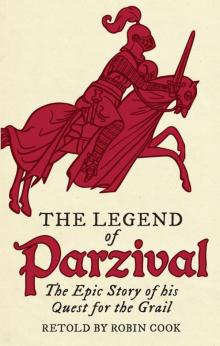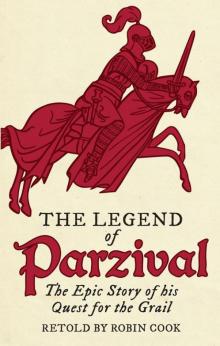- Home
- Robin Cook
The Legend of Parzival: The Epic Story of His Quest for the Grail Page 3
The Legend of Parzival: The Epic Story of His Quest for the Grail Read online
Page 3
“How?”
“At the height of the battle, as his valour drove the Baruch’s enemies back. His adamant and diamond helm had magic powers, and had always withstood the mightiest strokes, but some cursed magician, adept in the black arts, contrived to pour a he-goat’s blood on it, making it as soft as sponge. Little knowing, he rode into the thick of battle, and a lance split the helmet open, delivering the fatal wound. He only lived long enough to make his confession, and send you this token.”
The squire proffered a bloody piece of silk, and she recognised it as one of her own shifts. Gahmuret had worn it next to his skin as a reminder of his wife. She took it in dismay.
“The Baruch gave him a noble funeral. Such is his generosity, he raised a Christian cross above the grave and made an inscription praising Gahmuret above all others.”
The grief-stricken Herzeleide bore her loss bravely but at the same time resented the death of her beloved Gahmuret and the waste of human life. She received loving care from all around her, and she needed all her strength, as her baby would soon be born. It gave her some comfort to know she would soon bear her husband’s child.
Only three weeks later she gave birth. A long and difficult labour it was, and when the baby boy was delivered, everyone commented on his healthy size. She pressed the little chap to her breast and called him, “Bon fils, beau fils, cher fils,” and let no one else attend to his needs. Thus she was filled with joy, but a joy tempered with sadness.
Chapter 3
Herzeleide was heartbroken by the death of her husband, and there was little that anyone could do or say to console her. Only her newborn child could bring a smile to her wan features. For a long time she could not think what to do. Yet as the weeks went past, she and her son became stronger, and slowly a plan formed in her mind. At first she only confided in her niece, Sigune.
“My dear,” she said one afternoon when they were alone in the castle garden, “I have decided to go away for a while, where no one can find me and where my cher fils can grow up far from the company of fighting men.”
Sigune turned her calm grey eyes on her aunt’s face and saw the determined set of her mouth. She knew Herzeleide well enough to know when she was not to be persuaded.
“Where will you take him?” she asked. “Where will his royal blood not be noticed?”
“I shall leave in a day or two, taking only our old nurse and her husband. I shall say I am going to the monastery of Jouarre to seek advice from the abbot. Then I shall hide myself so deep in the forest of Soltane that nobody will ever find me, or my bon fils.”
“I shall miss you,” said Sigune. “Are you hoping to keep your little boy away from knighthood and the courtly life, and everything that entails?”
“Yes. I want to keep him from all the violence, betrayals and dishonesties of this world. Perhaps that will be possible.”
Sigune smiled and kissed her on the forehead. “That will be difficult, but I understand. At least tell me his name! You have not even named him. You just call him bon fils, beau fils or cher fils.”
“I think I have a name,” said Herzeleide, with a tired smile. “I will tell you before I leave.” Rising from the bench they had been sitting on, she disappeared down the path to the orchard where her little boy took his afternoon sleep.
Herzeleide soon put her plan into action. She told her chamberlain that she intended to travel to the monastery of Jouarre and he arranged for a small retinue to accompany her. However, the day after their departure, Herzeleide dismissed the men-at-arms and instructed them to return to Kanvoleis. She, with her nurse and her husband, then left the road and entered the vast forest of Soltane.
Herzeleide knew it would be almost impossible for any followers to find her, but she herself had a good idea of what she was looking for. Sure enough, she had not been travelling for more than two days before she found a little settlement where a few peasants were able to live well enough on the produce of the forest and their own simple crops. Of course, the twenty or thirty inhabitants were eager to hear where she had come from and why she wanted to stay, but she was able to satisfy their curiosity without telling too much. Soon Herzeleide and her companions built themselves a shelter and set about living the simplest of lives.
How Herzeleide loved her little son! And what a bonny child he was, with a winning smile and sweet nature. He played with the other boys and girls while he was little, and as he got older he learned to help in the fields and the home. It was a simple life and he was blissfully happy. Of course he had all the little disappointments and trials of childhood, but there was always someone there to help and comfort. He knew nothing of the world outside the forest and Herzeleide had given strict instructions that no one should mention the words ‘knight’, ‘court’ or ‘castle’, which the simple folk found easy, as they had little enough idea themselves. Sometimes Herzeleide wondered whether bringing him up in such ignorance was the right thing, but she comforted herself with the thought of the good people around him. She put him to bed each evening as the sun went down and said prayers with him. When he was a little older, she taught him how to draw letters beautifully and how to read. But there was little call for this in the life they led, and although he was quick to learn, he was even quicker to get outside and play with his friends.
As he grew up it became apparent he was not only big for his age but also very skilful with his hands. He busied himself making a bow and arrows, under the instruction of one of the farmers in the village, and he practised diligently till he became an accurate marksman. Similarly, he showed great skill in making javelins, hardening the tips in the fire and using them for hunting in the forest. His mother could not help but notice his father’s fighting skills in him, but she said nothing, partly because of his evident delight in his achievements, but also because he was able to bring back much-needed food. When he brought down a deer, he thought nothing of carrying his quarry back on his shoulders, though others would have needed a mule for such a task. At the same time, she also worried a little because he could be very naive. On one occasion, he arrived home in tears.
“What is the matter?” she asked as he appeared at the door.
“I killed it! And now I’m sorry! I loved the song, and now it has stopped. What’s wrong with me?”
“What have you killed?”
“A bird, a song thrush.” His blue eyes were bright with tears.
“There’s nothing wrong with you,” she said comfortingly. “You’ve killed one of God’s creatures, so of course you are sad.”
“What’s God?”
Herzeleide looked at him wonderingly. Yes, he was getting older, and it was difficult to know how to answer such a question.
“God is in the sunlight and he came to earth as man. That is why you love all that is good and beautiful and true. You pray to him, for he is faithful. But there is also the Prince of Darkness, who dwells where there is no light. He is faithless and inconstant. Put him behind you.”
He gave her one of his long, penetrating stares and then, as is the manner of youth, brushed aside his tears and ran outside. Though he had not really understood what his mother had said, he kept it in his heart.
Herzeleide began to feel that life could not go on like this for ever, and her heart grew heavy. Her son was almost a man. Her bon fils, beau fils, cher fils was beginning to look at her differently.
Then the fateful day came. Herzeleide waved to her son in the morning as he went off to hunt boar, carrying a bundle of javelins with him. It was a beautiful day with a clear blue sky, and bon fils had a spring in his step as he made his way through the woodland. Shafts of sunlight shone through the branches of the majestic oak and beech and his heart expanded in joy. All was quiet when he stooped to examine signs of wild boar. Then an entirely new noise came to his ears: a sort of thudding, followed by a delicate jingling of tiny bells.
“What’s that?” he thought. “Perhaps it’s the Prince of Darkness my mother told me about.” And he smiled, gr
ipping his spear a little tighter.
Light flashed before his eyes and three knights in full armour cantered into the glade, the sun striking through the forest canopy onto their burnished breastplates and dazzling him. Pennants fluttered from their spears and they wore richly embroidered surcoats. They drew their horses up when they saw him, and the horses snorted and champed as they came to a halt. The first knight eyed the young man in front of him a little warily. He was gawping at them.
“Are you God?” he asked.
The knight exchanged glances with his two companions and replied, “No! I’m not God, though I do my best to serve him in every way I can. We’re looking for a lady who has been abducted. Have you seen anybody?”
“If you’re not God, what are you then?” said the astonished young man. “And what’s that stuff you’re wearing?” He moved forward and fingered the chain mail and the little bells on the harness. The tinkling delighted him. He looked in awe at all their accoutrements.
“That’s chain mail. We wear it to protect ourselves from blows in battle,” said the knight.
“It’s a good thing the deer don’t wear this. I’d never manage to kill one!” He pointed at the scabbard by the knight’s side. “What’s that?”
“My sword,” he said, easing it half out. “Look, sonny, we’re in a bit of a hurry. We have this lady to rescue from a knight who has abducted her. He’d be dressed like us.”
“What’s a knight?”
“We’re knights,” laughed the man. “So have you seen anyone who looks like us, with a lady?”
“No, I haven’t. How do I become a knight?”
“How do you become a knight? Well, that’s not too likely, even though you’re a fine-looking lad. Big chap, I can see that. You have to get to the court of King Arthur and train for a few years, and then you might be lucky.”
“Who’s King Arthur? Where does he live?”
“Too many questions, sonny. Haven’t got the time for all that. We’ll be on our way.”
And the three knights trotted off through the forest, laughing with each other at this simpleton. However, something had changed for beau fils. He ran with long, purposeful strides through the woodland and back to the village.
When Herzeleide saw him approaching, her heart began to beat faster. Something had happened. He looked different.
“Mother!” He gave her a huge warm smile. “I’m going to be a knight!”
The colour drained from her face. Her heart pounded uncontrollably. She had to sit down, scarcely able to breathe.
“What’s wrong, Mother?” he asked, bringing her a cup of water. “I thought you’d be pleased. I met three knights in the forest. They looked… magnificent. I’ve never seen anything so noble and grand. And they told me how to become like them. I’m going to King Arthur, Mother!”
“Where… where is King Arthur? Did they tell you?”
“No, but I’ll find him. It can’t be that difficult. I’ll just ask people.”
Slowly, Herzeleide pulled herself together. This is what she had most feared, but she could not be angry. He was so pleased and happy. Deep down she had to admit that she had known this would happen one day, but it did not make it any easier to bear. He could talk about nothing else. She tried to dissuade him, talking of the difficulties and dangers and all the obstacles he might face, but he had an answer for everything, and at length she gave in. She agreed to borrow a horse for him and get him some new clothes, but little did he realise that she was hoping to make him look so foolish that people would laugh at him and he would come back home to her. She found him a lame old nag which was too old to work. Then she made him a shirt and breeches out of sack-cloth, and gave him some large, clumsy calf-leather boots. He thought he looked pretty good!
“Wait till King Arthur sees me!” He beamed, and Herzeleide’s anguish almost disappeared in the face of his naive enthusiasm. Then she gave him some advice.
“If you meet an older man, learn from him and take his advice. If you meet a lady then you must be polite, and if she gives you a ring then you may ask for a kiss. That will bring you good luck. When you meet someone, always greet them and wish them well.”
He looked at her in silence, puzzled. Some of it seemed obvious; other parts he did not understand, particularly the bit about the lady.
“Yes, Mother. Don’t worry about me. Everything will be fine.”
And off he went, intent on finding King Arthur, and only just remembering to give a cheery wave as he disappeared into the forest.
Herzeleide was never to see him again. So sad she was, she pined away. Life had no more joy for her. She had sacrificed all for him and now he was gone. It was not long before she died quietly in her bed.
Of course beau fils knew nothing of this as he trotted through the woods, occasionally meeting someone and calling out, “Good day and may God be with you! My mother told me to say that!”
It was on the second day after his departure that the first of many curious events took place. He was following the bank of a river, looking for a ford, when he noticed a pavilion pitched in the glade on the opposite side. This was interesting! He immediately splashed across the ford and got off his horse to have a good look. Little did he know this was the pavilion of the Duke Orilus, slayer of his uncle Galoes. All he noticed was a beautiful lady, Orilus’s wife, the Lady Jeschute, lying asleep on a couch, her sable coverlet slipping down to her hips, her red lips parting slightly as she breathed. She was a most enchanting sight. However, what our young hero noticed was the ring on her finger. He remembered what his mother had told him and knelt down to remove the ring, thinking that would earn him a kiss. The ring slipped off easily enough, but as he leant forward to get his kiss, the lady awoke in fright.
“Oh! What are you doing? Go away!” she exclaimed, pushing him away and hastily covering herself up. “Who are you?”
Bon fils was much abashed and so confused he could only stammer incoherently.
“Oh! Er… Er… Yes… My name… And my mother told me…”
The Lady Jeschute took him for a fool, but she was a little afraid, as none of her servants were nearby.
“Tell me what you want,” she said, trying to look as authoritative as her déshabillé would allow.
“Oh,” said bon fils, still nonplussed by the situation. “What do I want? Oh, I’m not sure… Well, actually… I’m hungry.” He grinned broadly.
“Well, you can’t eat me! There’s some food over there. Take some and go.” She gestured towards a table just inside the pavilion, hoping this would get rid of the simpleton. She was much relieved when he went over to the table and helped himself liberally to some cold partridge and a meat pie. The Lady Jeschute was just recovering her composure when she noticed her ring was missing. He heart began to pound again, for she feared her jealous husband.
“Where is my ring? You must give me back my ring!”
He looked up from his meal and grinned foolishly. “I have your ring and you must give me a kiss.”
“Give you a kiss? What do you think I am? When my husband comes back he will beat you!”
“I’m not scared of your husband, whoever he is. But seeing as you want me to go, I’ll go.” And he walked off and clambered onto his horse.
“You must give me that ring,” she cried. “I’ll give you this instead.” And she proffered him the brooch which fastened her slip, and a ring from her little finger. He looked down at her and then got off his horse.
“All right,” he said, taking the ring off his finger, “but only if I get a kiss as well.”
The poor lady had to agree, and he offered her his cheek – to her relief. He handed her the ring and, whistling cheerily, clambered back onto his horse. He gave her his big innocent smile and said, “God be with you! That’s what my mother told me to say!” and disappeared into the wood.
Now the Lady Jeschute was distraught. She was relieved that she had got rid of the foolish fellow so easily, but her husband would be back any
moment. What was she to do? She knew what her jealous husband was like and he would guess that somebody had been there. She could not think what to tell him; it all seemed so improbable. She clutched the wrap around her and hurried to find her clothes, but at that very moment the duke returned and was immediately suspicious. He looked at the mess on the table, and then he looked at her.
“Who’s been here?” he demanded.
“Nobody! Well… someone did come past, but he’s gone.” Her confusion only made it all look worse.
“Why aren’t you dressed properly? You’re half naked. Where’s your brooch?”
“Oh!” she wept. “He took it!”
“Who took it?”
“A young man! I tried to stop him!”
“What? Handsome, was he?”
“Yes… I mean, no! He looked beautiful, in a sort of way, but he was a complete fool. I couldn’t help it.”
“Couldn’t help what?” The duke soon worked himself into a rage and shouted and bullied, and poor Lady Jeschute wept and could not convince him that the incident was innocent. Everything sounded foolish.
“After all I’ve done!” he roared. “The men I have conquered in your name, and you repay me by making me look a fool! Isn’t the odium I have earned from Arthur’s knights enough? You know my own sister, Cunneware, is at his court, waiting for the greatest knight of all to come. Only then will she smile. Her safety is my duty. I am the greatest knight, as many of Arthur’s knights will attest, but does she smile at me? These humiliations cannot be borne!” The duke seized Jeschute by the arm and threw her on the couch, then went inside the pavilion and threw all her fine clothes in a heap. He flung her a shift and a cloak belonging to the maid.
“There, wear those!”
He went to her horse, ripped off the finely worked saddlecloth and bridle, and gave her old ones.
“Now the world will see your proper position,” he snorted. He turned and shouted at the attendants to pack up the pavilion and prepare to move on.
What could Jeschute do? She had to accept this foul treatment, for she had nowhere else to go and no one to turn to.

 Shock
Shock Mutation
Mutation Chromosome 6
Chromosome 6 Brain
Brain Intervention
Intervention Invasion
Invasion The Legend of Parzival: The Epic Story of His Quest for the Grail
The Legend of Parzival: The Epic Story of His Quest for the Grail Acceptable Risk
Acceptable Risk Cell
Cell Fever
Fever Death Benefit
Death Benefit Contagion
Contagion Mindbend
Mindbend Coma
Coma Vital Signs
Vital Signs Harmful Intent
Harmful Intent Critical
Critical Foreign Body
Foreign Body Marker
Marker Blindsight
Blindsight Terminal
Terminal Sphinx
Sphinx Fatal Cure
Fatal Cure Host
Host Charlatans
Charlatans Crisis
Crisis Vector
Vector Toxin
Toxin Abduction
Abduction Viral
Viral Pandemic
Pandemic Outbreak
Outbreak Vector js&lm-4
Vector js&lm-4 Godplayer
Godplayer A Brain
A Brain Year of the Intern
Year of the Intern Outbreak dmb-1
Outbreak dmb-1 Cure
Cure Mortal Fear
Mortal Fear The Legend of Parzival
The Legend of Parzival Vital Signs dmb-2
Vital Signs dmb-2 Cure (2010) sam-10
Cure (2010) sam-10 Blindsight sam-1
Blindsight sam-1 The Year of the Intern
The Year of the Intern Intervention sam-9
Intervention sam-9 Foreign Body sam-8
Foreign Body sam-8